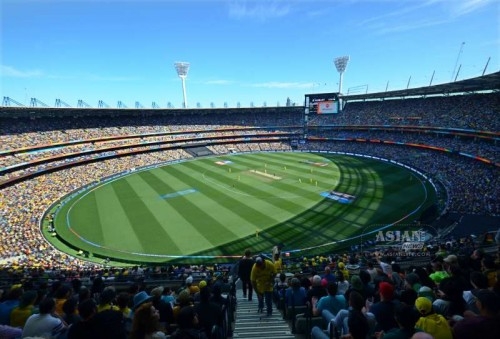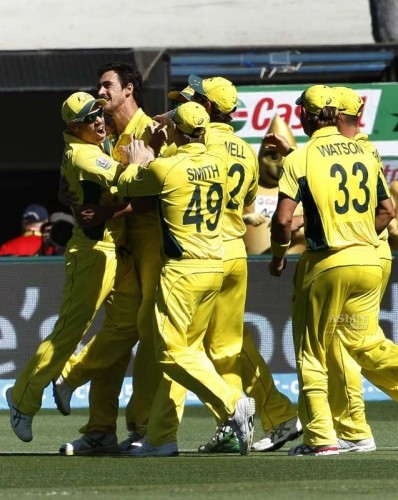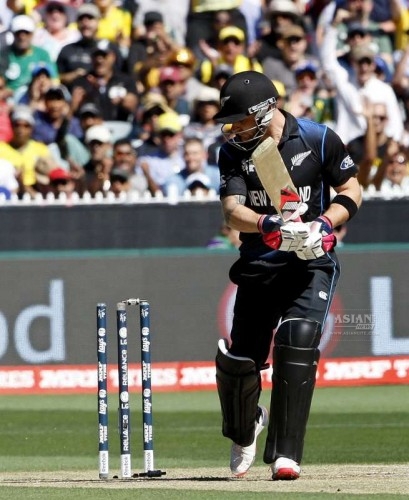 Australia became the first team to clinch five cricket World Cup titles crushing traditional rivals New Zealand by seven wickets in the final of the 11th quadrennial tournament at the majestic Melbourne Cricket Ground (MCG) here.
Australia became the first team to clinch five cricket World Cup titles crushing traditional rivals New Zealand by seven wickets in the final of the 11th quadrennial tournament at the majestic Melbourne Cricket Ground (MCG) here.
New Zealand’s hopes of trouncing their trans-Tasman big brothers — and 2015 World Cup co-hosts — in the latter’s backyard fizzled out as they were reduced to 39/3 in the 13th over. Grant Elliot (83) and Ross Taylor (40), however, sought to defy the odds with a 111-run stand for the fourth wicket.
But four-time World Cup champions Australia got the ascendancy eventually by bowling out their neighbours for a bare 183 in 45 overs.
Admirably supported by inspiring fielding, Australia seamers Mitchell Starc (2-20), Mitchell Johnson (3-30), James Faulkner (3-36) and spinner Glenn Maxwell (1-37) were all over the Black Caps, who lost the final seven wickets for barely 33 runs.
 The low total meant that Australia needed only to bat sensibly to capture their fourth title in the last five editions. And they did, getting over the line with contributions from skipper Michael Clarke (74 in 72 balls), Steven smith (56 not out) and David Warner (45).
The low total meant that Australia needed only to bat sensibly to capture their fourth title in the last five editions. And they did, getting over the line with contributions from skipper Michael Clarke (74 in 72 balls), Steven smith (56 not out) and David Warner (45).
New Zealand hopes soared when Australia lost opener Aaron Finch (0) in the second over of the inning. The right-hander gave a return catch to left-arm pacer Trent Boult.
But opener David Warner scored a stroke-filled 45 in 46 deliveries to diminish the pressure on the home team. After he fell to Matt Henry, Smith and Clarke consolidated the innings by playing risk-free cricket.
Clarke, who will retire from One-Day International (ODI) cricket after this World Cup, notched up his 58th fifty. Smith scored his seventh ODI fifty and stitched a partnership with the 33-year-old that took Australia home. Shane Watson remained not out for two.
on the first ball of the 34th over, Smith pulled pacer Tim Southee for a boundary to trigger wild celebrations in the Australian camp and among an applauding crowd in the MCG stadium.
Earlier, New Zealand won the toss and had a nightmarish start losing skipper Brendon McCullum (0) in the very first over. The right-handed batsman had his stumps shattered by left-arm pacer Starc.
 With this wicket, Australia took complete control of the match. With seamers Starc, Josh Hazlewood and Johnson operating with probing line and length, New Zealand batsmen Martin Guptill (15) and Kane Williamson (12) just managed to stave off the looming threat.
With this wicket, Australia took complete control of the match. With seamers Starc, Josh Hazlewood and Johnson operating with probing line and length, New Zealand batsmen Martin Guptill (15) and Kane Williamson (12) just managed to stave off the looming threat.
The home bowlers didn’t allow the visiting batsmen to score freely. As a result of this, New Zealand reached 31/2 in the first 10 overs.
After Australia brought in spinner Maxwell, New Zealand batsmen tried to cash in on the opportunity. But their ploy backfired as Guptill misread the length and was bowled by Maxwell to leave the team in a spot of bother at 33/2 in the 12th over.
However, Guptill (547 runs) took top spot as the highest run-scorer in the tournament, pushing Sri Lankan great Kumar Sangakkara (541) to second place.
Johnson dealt another blow to New Zealand as vice-captain Williamson offered a return catch to the left-arm fast bowler.
After 15 overs, New Zealand were reeling at 47/3 and in the next five overs Elliot and Taylor scored just 19 runs without the loss of any wicket.
Elliot, who scored an unbeaten 84 to down South Africa in the semi-finals, registered his ninth half-century in ODI. He led the recovery charge with a nicely paced knock.
The 36-year-old got good support from experienced Taylor and the partnership flourished.
On the first ball of the 36th over, left-arm pacer Faulkner broke the 111-run stand, forcing right-hander Taylor to edge behind. Two balls later, Faulkner rattled new batsman Corey Anderson’s stumps to deal the second quick blows.
Starc removed Luke Ronchi before the wicketkeeper-batsman could open his account. Michael Clarke took a sharp catch at slip to reduce New Zealand to 151/6.
Elliot’s defining innings of 83 ended as he edged a slow Faulkner delivery to wicketkeeper Brad Haddin. After his fall, New Zealand tail-enders failed to trouble the score-keepers, folding up for 183 — a total India defended against the mighty West Indies in the 1983 edition final.
Television presenters repeatedly debated on the India-Windies scoreboard. But a rampaging Australia didn’t allow the sport to witness a new champion and instead reasserted their supremacy in the ODI cricket.
It couldn’t be better for Clarke, who became the second captain — after Pakistani Imran Khan in 1992 — to bid goodbye to the 50-overs format with the biggest prize in cricket — that too at home.
Australia now have won 1987, 1999, 2003, 2007 and 2015 editions of the World Cup.